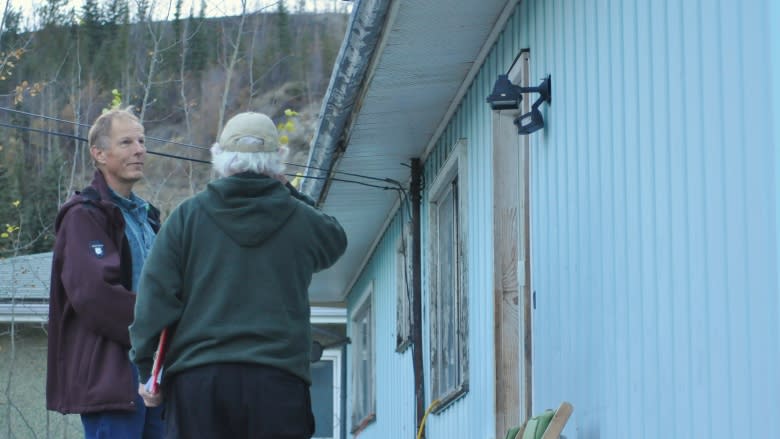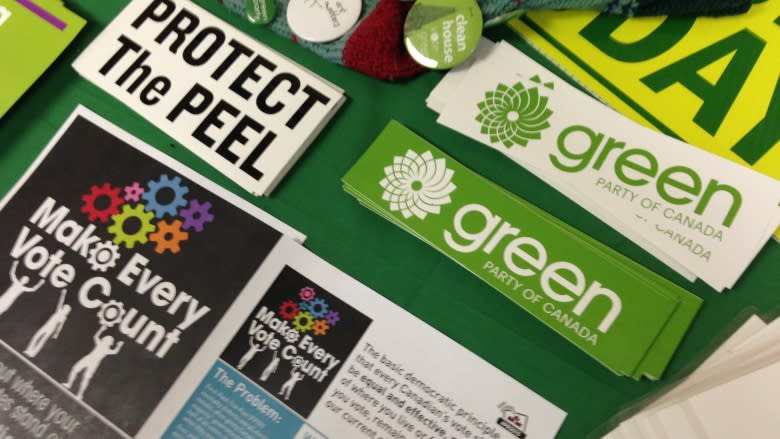Green Party's Frank de Jong asks Yukoners to follow their 'green conscience'
Frank de Jong has been a lively candidate in this federal election campaign.
He doesn't mince words. He has called the contentious Bill S-6 "bizarre and cowardly," and has called trophy hunting "obscene and immoral."
As for climate change, he believes the other parties "do not really care."
An elementary school teacher, de Jong led the Ontario Green Party for a remarkable 16 years before stepping down in 2009. Today, he lives in the small Yukon community of Faro.
His campaign has seen him step into the role held by John Streicker in 2011. Streicker's candidacy helped the Green Party to win 19 per cent of the federal vote in Yukon, ahead of the NDP. De Jong is not expecting a similar result this time.
Strategic voting and 'collateral damage'
De Jong said 2011's strong showing by the Greens caused a mixed reaction in Yukon.
Conservative Ryan Leef ended up winning the federal riding by a margin of 132 votes. De Jong has often heard the Greens accused of being "spoilers" that led to a Conservative win.
De Jong fears that this time around, those past Green supporters are taking their vote elsewhere.
"A lot of people tell us 'here's a donation but I have to vote for the other guy because I am afraid this other guy who's even worse will get in,'" de Jong said.
A recent poll in Yukon places Green support around 4 per cent, the lowest it's been in 10 years.
"There's a huge movement to 'un-elect' Stephen Harper's government and that piles on top of the very acrimonious debate in Yukon to 'un-elect' Ryan Leef," de Jong said.
"Obviously I'm going to be collateral damage in that, to some degree."
'Green conscience'
De Jong's campaign in Yukon has focused on door-to-door canvassing. The party has little money for advertising or lawn signs.
De Jong believes many people agree with his party's principles, though he says Greens are sometimes characterized as too idealistic.
"Most voters are still, I suppose you could say, in the Industrial Age thinking. And that's why we have not elected a huge number of [Green] MPs," de Jong said.
"Most people think you have to destroy the earth for jobs. And the Green Party's vision is that the environment and the economy work hand in hand. And until more people understand that we won't made a great amount of headway."
De Jong disagrees with the characterization of the Greens as a protest vote. He says his party has the same goal as the other major parties, "to be elected and to participate in government."
Nevertheless, de Jong says his efforts aren't wasted if the Greens don't win.
"The Green Party has been around since 1983, and just because you're not elected doesn't mean you don't have influence. Because we are in a sense, the 'green conscience' of the nation and that's a good thing whether you're elected or not," he said.
Hopes for voting reform
De Jong says he's excited about what might happen after election day if there's a change of government.
The Liberals and NDP are both pledging to reform the electoral system, which means this could be the last election the Greens are fighting under a 'first-past-the-post' system.
"If the NDP or the Liberals win, or there's a coalition government between the two, that would be fantastic," de Jong said.
"If they actually have the confidence to go ahead and modernize our electoral system, whether it's mixed-member proportional, or single transferable vote, or a ranked ballot system, the Green Party would very much like that."
In Yukon, there are four candidates running in the Oct. 19 federal election. CBC North will profile all four candidates.




